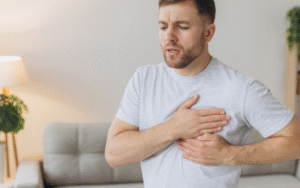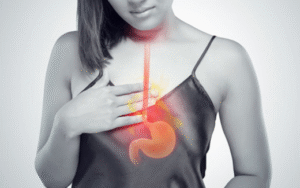Chest Discomfort After Drinking: What You Should Know
Chest Discomfort After Drinking may feel frightening. You might be in pain, you feel a tightness around your chest, you’re burning up. This may occur if you drink water, juice, soda or alcohol first. Sometimes it feels like the pain originates at your heart. It could even be from your stomach, other times. So let’s discuss why it tends to happen and what you can do to feel better. It can help you figure out if it’s a small problem or a big problem. That would tell you when to rest and when it’s time to call your doctor. It’s essential to pay attention to whether the pain only occurs occasionally or with every sip you take. “Keeping track of symptoms can work,” Dr. Woitalla said.
Understanding Chest Discomfort After Drinking
Chest pain after drinking refers to the feeling of pain, pressure, or burning in your chest when you sip on a drink. It could be cold water, hot tea, soda, alcohol. This pain may be sharp or dull. Some people sense it immediately. Others feel it later. It may not be from the heart. It can be from your stomach, muscles or throat. This a bit scary, but the pain often resolves on its own. If it keeps returning, it might be a symptom of another problem that requires attention. Record what you drink, however, and when to try to identify patterns.

Drink Temperatures and Chest Reactions
Yes, cold or hot drinks may produce chest pain after consumption. Cold drinks will actually tend up the chest muscles and make them cramp. Burn your food pipe with hot drinks. Sip slowly. Don’t gulp drinks fast. It can keep the pain from occurring. Your body can be quick to respond to the temperature, so you might feel a tight chest. If the pain is disabling each time, it may be wise to stay away from extreme temperatures in beverages. Altering the speed or volume you drink may reduce your risk of pain.
How Acid Reflux Plays a Role
Yes. Your stomach’s acid can strip the esophagus, and if it works back into the throat, that’s backwash. This is called reflux. It can lead to chest pain after you eat or drink soda, juice, coffee, or alcohol. Reflux burns and hurts. No lyin’ down after you drink. Remain seated to prevent acid from rising. Some people experience this more at night or after a large meal. Try to avoid the drinks that set off your reflux, and slow down when you eat to lessen feelings of burn. Sleeping elevated with the help of pillows might also alleviate reflux.

Alcohol and Chest Discomfort After Drinking
Other people experience chest pain after consuming alcohol. It might take your heart at rapid click. Or it may cause reflux. If you get chest pain every time you drink, it’s probably best to stop. Consult your physician if it comes back. Some drinks, such as beer and wine, can also produce gas in the belly and cause pressure. Reducing alcohol use can prevent chest pain and improve your health. You may also wish to experiment with nonalcoholic beverages to find out if the symptoms improve.
Stomach Trouble and Chest Pain Connection
Yes. Nerves in your stomach and chest connect. Which is to say: Stomach problems can feel a lot like chest pain. Most people also experience stomach pain after drinking water. That pain can travel up to the chest. Try to eat light meals. Stay away from spicy food and large drinks. Even water, when drunk too quickly, can feel bad. If you’re always getting hungry before heading to bed, talk to a doctor to get checked for ulcers or slow digestion. Eating more frequently, in smaller meals, might help alleviate pressure.
Gas and Chest Discomfort After Drinking
Yes. Bubbly drinks, like soda, can lead to gas. Gas in your belly makes your belly feel full. It rides up and can give you chest pain post-bar. Try less fizzy drinks. Feeling tightness in your chest after drinking soda can be an alarming reaction. Spitting and burping can help expel the entrapped air. Slow chewing and avoiding straws may also decrease swallowed air and gas. Keep your mouth closed while chewing to minimize air intake.

Warning Signs You Should Not Ignore
Usually, chest pain after drinking is not serious. But if it’s accompanied by chest pressure, shortness of breath, or arm pain, you should have it checked out by a doctor. It could be serious, like heart trouble. Don’t wait. When in doubt or in the case of new or scary pain, check with a doctor. Chest pain that comes with sweating or nausea is also a red flag. If it’s heart-related, fast action can save your life. Small problems can be prevented with early help.
Common Causes and Body Signals
Chest pain when drinking – what does it feel like? The feeling of chest pain after drinking alcohol? The sensation can range from tightness, pressure and burning to a sharp pain in the chest. You might notice it a few minutes after you drink, or you might notice it later. Typical culprits include acid reflux, cold beverages, alcohol or gas. Stress may also make your chest feel heavy. Keeping track of when it occurs can identify the cause. Keep a record of what you drink and when the pain begins to see a pattern. Understanding how your body works can keep you safe and feeling good.
Final Thoughts on Chest Discomfort After Drinking
It’s not so unusual to have chest pain after drinking. It could be due to acid, gas, cold drinks or you could be having a stomach problem.” It can seem scary, but it is often not dangerous. Pay attention to what triggers this pain. Avoid drinks that hurt. And who knows — if you get a stomach ache from drinking water, maybe a chest hurt as well. Pay attention to your body, and consult a doctor if you are concerned. Keeping a log of what you’re drinking and how you’re feeling makes it easier to discover a pattern. Your health is important, and little changes can make a big difference. Create experiences for your body that are soothing and safe.
FAQs About Chest Discomfort After Drinking
Why do I feel pain in my chest after drinking cold water?
Cold water can cause spasms in your chest muscles. This can be a feeling of tightness or a stabbing pain in your chest. It usually resolves rapidly but can be quite uncomfortable.
Is it bad to have chest pain after drinking alcohol?
Sometimes yes. It may just be reflux. But if it accompanies other warning signs, such as short breath or chest heaviness, see a doctor. Do not dismiss warning signs that might signal heart problems.
Is it possible to feel chest pain after drinking due to stress?
Yes. Tightness in chest due to anxiety and stress. If everything’s a-okay with your body but you are still in pain, stress could be to blame. Deep breaths and eating your food slowly can help to alleviate stress-induced pain.
Why do I have chest pain when I drink soda?
Soda adds gas to your belly. That can lead to bloating and pressure on your chest. It may be helpful to avoid fizzy drinks and to sip slowly on drinks.
Does water chest pain as well?
Yes, for some people. If you experience stomach pain after drinking water, then the pain may rise to your chest as well. This may be caused by gas or swallowing air too quickly.
Is it concerning if I only have chest pain when I drink?
If the pain occurs only when you drink something, it’s probably coming from your stomach or your food pipe. Even so, it can’t hurt to check with your doctor. Maybe it’s nothing, or maybe it needs attention.
What other symptoms should I watch for with chest pain?
Search for pain that radiates, chest pressure, sweating or feeling sick. These might be signs of heart and require rapid attention. If something feels very wrong, don’t wait.
Is there any way to avoid chest pain after drinking?
Yes. Try to take little sips, don’t eat or drink anything cold or fizzy and stick to light meals.” These moves can help stop the pain before it starts. Also, don’t eat when you are anxious, stressed, or tense.


